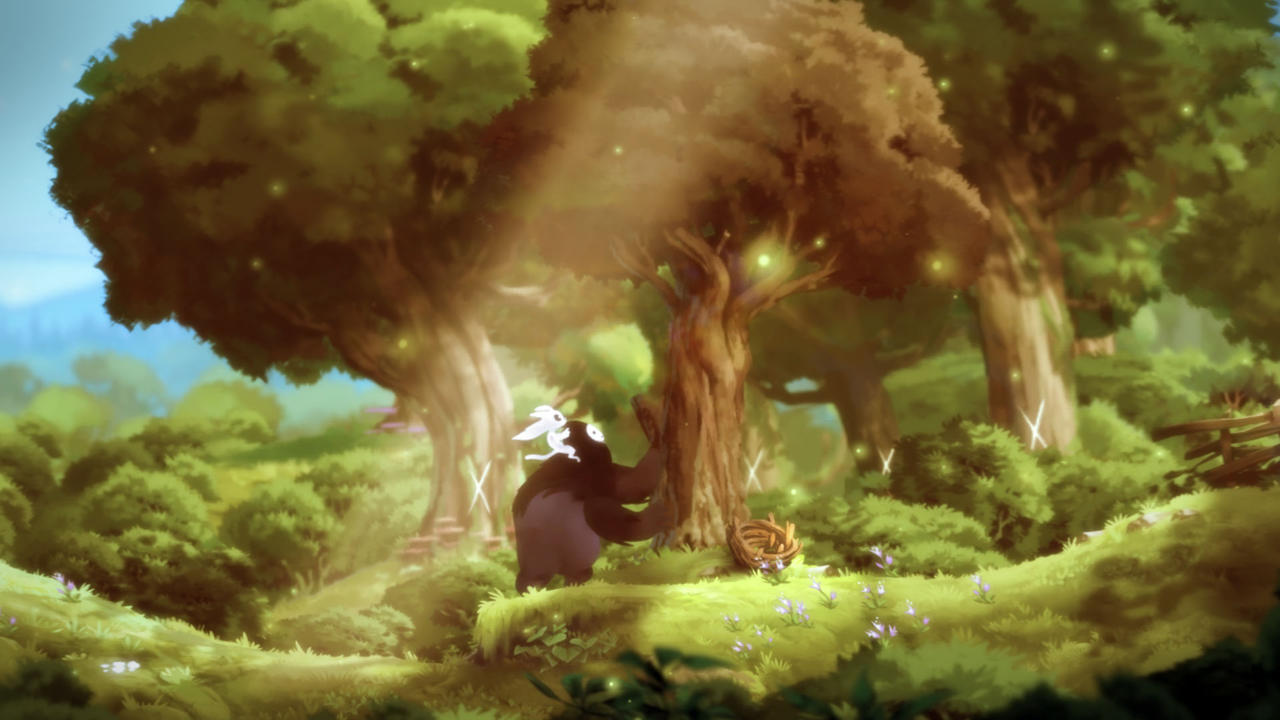E3 2014: Ori and the Blind Forest is a Beautiful Metroidvania
Never a repeated environment.
I was able to play Ori and the Blind Forest for some time on the E3 show floor, and as soon as I started the demo, I was entranced by its art. A lush forest stood around me, with gnarled branches and thorny bushes covering the background and the foreground. A small, shining, ethereal creature stood on the ground, vaguely raccoon-like in shape. The sky was speckled with stars. For a few moments, I didn't move. I watched my character breathe in and out, and I gazed at the environments.
According to developer Moon Studios, Ori is a Metroidvania adventure game with platforming like Super Meat Boy and Mario, art like Rayman and Child of Light, and story like The Iron Giant and The Lion King. From what I understand, then, Ori is a puzzle, and Moon Studios is attempting to fit the best elements of every part of games into a 2D open-world platformer. The developer has taken on a monumental task, but my hands-on time with Ori gave me many reasons to be confident in the team. The story is gripping, the RPG-like character progression seems deep, and above all, it is strikingly beautiful.

Moon Studios' gameplay programmer David Clark stood close by as I played the demo. I asked him about the inspiration behind the art, and he told me that the developer did, indeed, draw heavily from modern Rayman games. Clark told me that the team thought that Rayman's UbiArt engine gave the game an attractive and hand-drawn feel, but it didn't go far enough. In Rayman, some of the textures on the environments are patterned across levels, which just wasn't good enough for Moon Studios. Clark spoke at length about the guiding philosophy behind Ori's art: the developer is avoiding these patterns as much as possible because it wants each and every screen in the game to look uniquely hand-drawn. The team wants to create a living world, and Moon Studios will not accept repeated art. Clark told me that the visual style is a "love letter" to games of past generations and the experiences of the developers' lives. More than anything else in Ori, the art reflects the personalities of the team members.
When I began to play, I noticed that the movement was smooth and responsive, and each motion felt precise. I watched in interest as the fluid animations rendered my character bouncing and doing flips as I jumped around the world. The jumping felt different than other, similar games. My character felt weighty, and platforming required more concentration than I expected. Clark explained to me that the team drew inspiration from Super Meat Boy and Mario to make a game with precise and skillful platforming. The developer deliberately avoided the light and floaty jumping that Clark and other members felt plagued many otherwise good platformers. They want the jumping to be a part of the game as it is in Mario games, rather than just a means of traversal.

I continued through the demo and acquired my sidekick: a ghostly orb that let me attack enemies. I am uncertain about how well the team will pull off the combat in Ori; I only got to use a simple one-button attack. Considering the team's focus on platforming and art, it seems unlikely that Ori will implement a deep and tactical combat system. But Clark promised that as you progress through the world, the enemies become stronger and more diverse, so only time will tell if the combat contains more than just basic attacks.
And yet, that doubt slipped my mind as I instead became intrigued by the snippets of story that I caught while playing. In the game, you take control of a creature that was raised by a bearlike "mentor," as Clark describes it. One day, an evil owl, the game's antagonist, took this mentor away. Your task is to discover what happened to the mentor.
What I saw during my demo was mysterious and vague. A lot of it revolved around the semi-sentience of the forest and the ability of certain trees to provide skill and knowledge. I asked Clark about the narrative and he refused to tell me much, keeping even the basics a secret. He did tell me, however, that the team was heavily inspired by The Lion King and The Iron Giant, and that Ori and the Blind Forest is a coming-of-age story. He specifically mentioned the importance of self-discovery.
Much of what sounds most interesting about Ori and the Blind Forest is still shrouded in secrecy. The character system, the extent of combat, and the story only have been slightly detailed at this time. But Moon Studios is shooting for the stars with this game, and from my short demo, I am encouraged. Although I am still uncertain about the developer's ability to pull together so many different elements, already I saw the puzzle pieces fitting together. By tying the game to such icons as Mario and The Lion King, Moon Studios has created high expectations for the game, but my demo gave me faith that the developer can pull it off.
Ori will come out this Fall for the Xbox One and PC.
Got a news tip or want to contact us directly? Email news@gamespot.com
Join the conversation